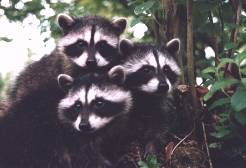
Native American words in English
 |
Spotlight on... |
Native American words in English |
As we point out in Sez
You... below, one of the fascinating aspects of English is its
ability to acquire words from other languages. While most of us are well
aware of the contributions to our vocabulary made by Greek,
Latin, French and other European tongues, how often do we consider how many
words were borrowed from Native American languages? Such words
as teepee, wigwam and papoose may seem obvious but take
a look at these:
Greek,
Latin, French and other European tongues, how often do we consider how many
words were borrowed from Native American languages? Such words
as teepee, wigwam and papoose may seem obvious but take
a look at these:
Caucus (a private meeting of the leaders of a political party), pecan, persimmon, Podunk (that paradigm of geographic obscurity), raccoon, terrapin, toboggan, geoduck (a grotesque-looking yet edible mollusk whose name is pronounced "gooey-duck"), opossum, woodchuck, plantain (the overgrown banana, not the lawn weed), [high-]muck-a-muck, squash (the vegetable), and moccasin.
From the Carib, the eponymous Indians of the Caribbean, come:
barbecue, buccaneer, cannibal, curare, hammock, hurricane, iguana, macaw, mahogany, maize, manatee, pawpaw, peccary, tobacco and yucca.
One of the earliest references to the word yankee derives it from the Cherokee eankke meaning "slave" or "coward". This less-than-flattering derivation is probably incorrect [see Issue 15]but may still offend some of our more patriotic readers. All we can say is, go ahead, Sioux us!
Finally, we cannot resist mentioning that wonderful palindrome kinnikinnik, the name of a Native American tobacco substitute made from dried sumac leaves and the inner bark of the dogwood or willow. We admit that this is pretty obscure, but it is the only word we know which includes the letter k more than twice.